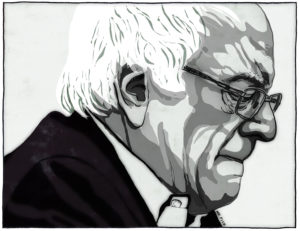Marie Cocco: The Meltdown We’re Not Supposed to Talk About
The American middle class is in a free fall. But if Congress and the White House were to acknowledge the problem, then they might have to do something about it.WASHINGTON — Meanwhile, back on the home front:
Wages, after inflation, have been dropping. Median household income has fallen five years in a row. Fewer Americans can get health insurance through their employers, and when they do, workers and their companies face double-digit premium hikes. Pensions are being wiped out, a promise to longtime workers broken with an excuse about “competitiveness,” the new code word for corporate greed. Did I forget to mention gas prices?
The media’s necessary preoccupation with war is a political handmaiden to the congressional predilection to ignore the obvious. The American middle class is melting down. The Bush tax cuts — essentially the only economic policy we’ve had for five years — aren’t firming it up.
No one is supposed to talk about this. If Congress and the White House were to acknowledge the problem, well then they might have to do something about it.
Into this void steps the Democratic Leadership Council, the centrist organization that has fallen out of political favor as the presidency of its preeminent alumnus, Bill Clinton, becomes history. A year ago, the DLC put a certain other Clinton, now a senator from New York, in charge of something it calls “The American Dream Initiative.” It is aptly titled, since the dream can’t be realized when stagnant wages are hit with the multiple whammies of higher health insurance costs, inflated college tuition, out-of-whack home prices and outrageous pension terminations.
So for the first time in years, someone with a big enough megaphone to be heard — it surely helped the group to have Hillary Rodham Clinton — is talking about what many Americans talk about after the kids have gone to bed. Among the best proposals are one that would consolidate the confusing hodgepodge of tax breaks for college (tilted, right now, toward those who already can best afford higher education) into a single, $3,000 refundable tax credit that would be available to all.
Another is the sad but necessary recognition that 401(k) savings accounts have all but replaced the traditional pension that once guaranteed monthly payments in retirement. For more than two decades, employers have pursued these savings accounts as a way to shift the responsibility and risk of preparing for old age onto workers. Even so, only half of American employees are offered such plans.
The DLC proposal would require all but the smallest companies to at least open an account for each employee; enrollment would be automatic unless the worker opted out. Retirement savings would begin earlier than most workers start now and be more consistent over a lifetime of work — one answer to the chronic problem of paltry 401(k) balances among most of those lucky enough to have them.
Clinton, a self-proclaimed believer in “small steps” since her failed attempt at broad health insurance overhaul during her husband’s first term, seems to have included only the tiniest step in this plan: a call for universal coverage for children only, and creation of a nationwide pool through which small businesses could purchase policies more cheaply.
Few of these ideas are new. Congressional Democrats long ago proposed automatic enrollment in 401(k) plans, and Sen. John Kerry (D-Mass.), during his 2004 presidential campaign, promoted health insurance coverage for all children.
Republicans brand the DLC plan a “tax-and-spend” debacle. It is an odd argument from a party that has squandered a surplus projected at $5.6 trillion when President Bush took office, and replaced it with recurring deficits. The national debt has correspondingly risen by 42%. In truth, the Democratic proposals are all offset with various revenue-raising measures, the most promising of which would aim at collecting about $250 billion in unpaid taxes on income from capital gains.
Yet the horrendous state of the nation’s fiscal affairs raises a question the “American Dream Initiative” doesn’t even attempt to answer: What should become of the Bush tax cuts, those generous gifts to the best-off Americans, gifts that have done nothing to promote the general welfare? They may well be scaled back in some future deficit-reduction plan, but not right now. “Our purpose here was to identify what would pay for our (proposed) programs,” says Paul Weinstein of the Progressive Policy Institute, one of the initiative’s authors.
The compendium may or may not be the initial platform of a future Clinton presidential campaign, or a wish list for some other candidate. The politics are of less significance than the importance of an effort to replace the cynical neglect of the Bush years with some ideas of substance.
Marie Cocco’s e-mail address is mariecocco(at symbol)washpost.com.
Your support matters…Independent journalism is under threat and overshadowed by heavily funded mainstream media.
You can help level the playing field. Become a member.
Your tax-deductible contribution keeps us digging beneath the headlines to give you thought-provoking, investigative reporting and analysis that unearths what's really happening- without compromise.
Give today to support our courageous, independent journalists.






You need to be a supporter to comment.
There are currently no responses to this article.
Be the first to respond.